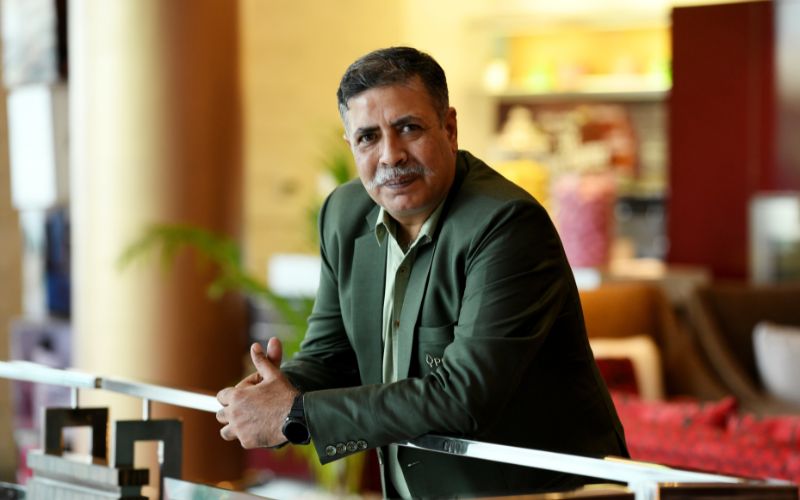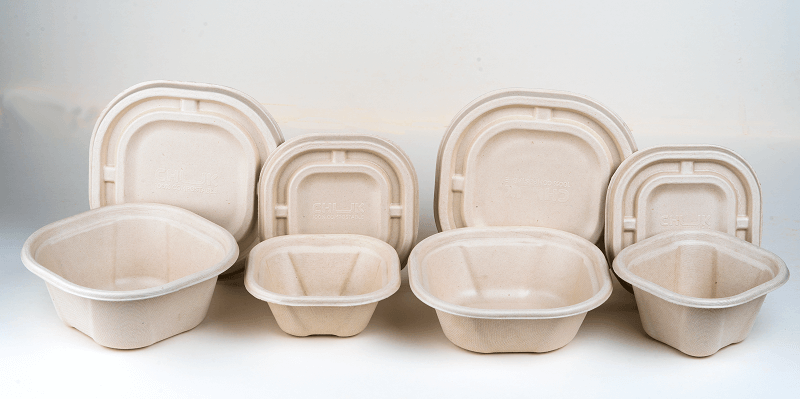Marking a significant milestone in India’s sustainable packaging industry, Pakka strives to balance compostability, performance, and cost-efficiency in its engineered molded fiber products. Backed by CIPET compostability certification, SGS US FDA approval and other certifications, the company is not only serving high-demand markets like India, but has also entered 7 international markets- including the US. During an exclusive chat with Paper Mart, Mr. Jagdeep Hira, India Business Head, Pakka shared that the company envisions to become a regenerative global leader and is developing a strategic regenerative partnerships (SRP) program, a collaborative framework designed to build a circular ecosystem that supports both environmental and agricultural health.

Paper Mart: The plastic reduction movement has gained momentum through both regulatory action and consumer demand. From your perspective, which force has more directly impacted the momentum around reducing plastic waste? What specific event or market shift prompted your company’s strategic response?
Jagdeep Hira: Regulatory measures have been important to fasten the shift towards biodegradable alternatives. India’s nationwide ban on specific single-use plastics in July 2022 significantly impacted the market. Internationally, similar regulations in the EU and the US have spurred demand for sustainable products. At the same time, rising consumer awareness is now playing a crucial role. In India, especially among urban consumers, there’s a noticeable shift in purchasing behaviour.
This change is driven by health, environmental concerns, and social influence. It’s visible in B2C demand across food delivery platforms, cloud kitchens, and retail. In fact, plastic disposables and styrofoam are no longer even listed on many quick-commerce platforms, reflecting not just regulatory enforcement but a broader rejection of toxic materials by both consumers and marketplaces. Regulation may set the floor, but consumer demand is raising the bar for cleaner production, safer materials, and responsible disposal.
PM: What quantifiable advantages led to selecting bagasse as primary raw material? How do you balance environmental claims against practical constraints like supply chain reliability and product performance metrics?
JH: We chose bagasse, the fibrous residue from sugarcane processing, as our primary material due to its environmental benefits and reliable supply chain. Bagasse is a renewable resource that decomposes naturally within 60–90 days. Tableware made from bagasse is sturdy, heat-resistant up to 120 degree Celsius, and suitable for both hot & cold foods. It’s also microwave and freezer safe, ensuring versatility in various food service scenarios. India’s abundant sugarcane production ensures a consistent and sustainable supply of bagasse, supporting large-scale manufacturing without depleting natural resources.
While bagasse offers clear environmental advantages, we’ve equally prioritized performance and operational efficiency. We address real-world constraints like water usage and energy demand with circular solutions. Given the ongoing water crisis, we recycle and reuse 50 percent of the water back into our process stream. Additionally, we operate two boilers that allow us to run the plant 95 percent off-grid. We also recover and reuse 95 percent of the chemicals from used materials, significantly reducing waste. Above all, we source all our raw materials within 200 km radius of our manufacturing plant.
Watch: In Pursuit of Lesser Water Footprint
PM: The terms “biodegradable” and “compostable” carry distinct certification requirements yet are used interchangeably in the marketplace. How does your company address this distinction when developing products? What impact has this had on your certification strategy and manufacturing processes?
JH: At Pakka, we know the difference between biodegradable and compostable. Biodegradable simply means a material can break down over time by natural processes. Even plastic can technically be biodegradable over hundreds of years, often breaking into microplastics that are harmful to ecosystems. Compostable, on the other hand, means the material completely breaks down into natural elements without leaving any toxins, and enriches the soil. It must disintegrate within a set time frame under composting conditions, usually within 180 days in an industrial facility.
To ensure our products meet the highest environmental standards, Pakka has obtained several certifications. While CIPET compostability certification confirms that our products meet Indian standards for industrial compostability; approval from the SGS US FDA ensures that our products are safe for food contact, aligning with our ‘Eat Safe’ promise. The SGS overall migration test verifies that our products do not release harmful substances during use, while the SGS microwave resistance test confirms that our products can withstand microwave heating without degrading. The SGS microbiological certification ensures our products are free from harmful microorganisms. MEREIUX heavy metals free verifies that our products do not contain heavy metals, ensuring safety and compliance. The ISO certifications, including 9001, 14001, 22000 and 45001 demonstrate our commitment to quality management, environmental management, food safety, and occupational health & safety.
Our adherence to these certifications influences our manufacturing processes as well. Our processes are chlorine-free and non-toxic, eliminating harmful chemicals; safe for food contact, upholding our ‘Eat Safe’ commitment; and efficient in resource use, with 50 percent water recycling and 95 percent chemical reuse, and operating 95 percent off-grid. By strictly adhering to compostable standards and avoiding ambiguous claims, we ensure that our products are safe for consumers and the environment.

Through the Good Garbage Podcast, packaging education and collaborations with sustainability-minded brands, we’re nurturing a new generation of buyers who value end-of-life impact.
PM: Market adoption of biodegradable tableware appears driven by multiple stakeholders. Between corporate sustainability initiatives or B2B clients, consumer preferences and regulatory frameworks, which segment has most meaningfully influenced your sales growth? How has this mix evolved in the last few years?
JH: Each of these factors has played a pivotal role in driving both market growth and our own sales trajectory. In recent years, corporations across industries have increasingly adopted sustainability as a core element of their brand identity. From global foodservice giants to local hospitality chains, businesses are seeking alternatives to single-use plastics as part of their sustainability agendas. Internationally, companies like Starbucks and McDonald’s have committed to eliminating plastic disposables, which has directly influenced demand for eco-friendly tableware. In India, major brands like Taco Bell & Haldirams in the QSR sector are following suit.
B2B clients, especially in foodservice and hospitality, have become increasingly aware of the need for environmentally friendly, yet high-performing, alternatives to plastic. With new government regulations and the rise of corporate sustainability programs, many of our clients are making more eco-conscious purchasing decisions. Pakka has seen a significant surge in orders from caterers, QSR chains, and institutional buyers looking for certified compostable alternatives. Consumer preferences have shifted dramatically, with more customers prioritizing environmental responsibility in their purchasing decisions. According to a 2023 study by NielsenIQ, 73 percent of consumers are willing to pay more for eco-friendly products. As consumers increasingly demand sustainable packaging, businesses have responded by turning to biodegradable and compostable options.
Regulations, both national and international, have catalyzed the transition away from single-use plastics. In India, the nationwide ban on certain single-use plastics in 2022 prompted a marked rise in demand for biodegradable alternatives. Similarly, Dubai’s complete single-use plastic ban has accelerated the adoption of compostable materials across the region.
PM: Which specific markets or customer segments have driven growth for your company, and what factors are accelerating their transition from conventional plastics?
JH: The adoption of biodegradable tableware shows uneven development in terms of regions, industries, or buyer personas. We’ve observed some unexpected pockets of rapid adoption of compostable tableware that have significantly contributed to our growth, such as the rise of quick commerce platforms and rapid growth in export markets. The explosive growth of quick commerce apps and hyperlocal delivery platforms in India has created a direct-to-consumer (D2C) channel that was previously untapped. These platforms prioritize speed and convenience but are increasingly mindful of sustainability due to rising consumer awareness.
On the international front, demand for certified compostable tableware is rising rapidly, especially in Europe, the US, and parts of Southeast Asia. Export opportunities have opened up new revenue streams and incentivized us to scale up quality and certification standards. This global interest validates our product innovation and encourages continuous improvement in supply chain reliability and performance.
PM: What specific technological advancement, whether in raw material processing, manufacturing techniques or product design, has most significantly enhanced your competitive position in this sector?
JH: Innovation in materials science is rapidly transforming the sustainable packaging sector, with global shifts towards compostable materials and plastic alternatives. Across the world, brands and governments are moving away from fossil-based plastics. Markets like the EU, the US, and parts of Asia are enforcing bans on single-use plastics and PFAS chemicals, while pushing mandates for home and industrial compostability. In response, leading innovators are adopting molded fiber packaging from agricultural waste; bio-based coatings and laminates (e.g., PLA, PHA, PBAT); and water-based dispersion barriers to replace PE/PET layers.
We’ve pioneered techniques to process agro-residues into high-performance molded fiber. Globally, brands struggle to balance performance with compostability. Our R&D is addressing this through exploration of PLA and PLA-PBAT laminated moulded products for oil & moisture resistance, and by exploring aqueous coatings and barrier starches that meet compostability standards. Utilizing 3D printing, rapid CAD iteration and modular mould systems, we’re able to launch our new products in the market in a well-efficient manner, reduce tooling lead time by over 30 percent, and scale with MOQs suited for regional rollouts.
Global leaders like Nestle, McDonald’s, Unilever, and IKEA are investing in molded fiber to replace PET, EPS, and laminated paperboard. However, challenges around barrier performance and cost-efficiency persist. CHUK has gained competitive advantage by offering price-competitive, scalable alternatives with local manufacturing in India; serving both high-volume Indian QSRs and compliance-heavy US markets; and by backing claims with Life Cycle Assessment (LCA) data and certification-ready products.
PM: Is your R&D primarily focused on matching conventional plastic properties, or are you investing in shifting market expectations about what tableware should deliver?
JH: At Pakka, we believe that the future of product development in sustainable packaging lies in balancing two parallel R&D priorities – matching essential functional attributes of plastic, particularly for food safety, delivery integrity and user convenience; and redefining consumer expectations by normalizing compostable, minimalist, and eco-conscious alternatives as the new standard, not as compromises.
Globally, many brands remain anchored to plastic due to its barrier properties, structural rigidity, and cost-efficiency. Recognizing this, our R&D has focused on bridging the performance gap through engineering molded fiber products with strong edge sealing and rigidity; developing bio-based coatings and lamination films (e.g., PLA, PLA-PBAT blends) that offer grease resistance, water vapor barrier, and heat sealing—on par with plastic-laminated paperboard; and by innovating in design for nesting, stacking, and delivery durability, critical for QSR and cloud kitchen logistics. This plastic-equivalent performance is crucial to support adoption at scale, especially in high-demand markets like India and the US.
At the same time, we acknowledge that true innovation requires a cultural reset around disposables. Our goal is to make compostable, uncoated, mono-material products the aspirational norm. We prioritize design storytelling, highlighting raw texture, earth-toned colors, and branding. Through the Good Garbage Podcast, packaging education and collaborations with sustainability-minded brands, we’re nurturing a new generation of buyers who value end- of-life impact. Globally, leading brands like IKEA, Just Salad and McDonald’s Europe are similarly shifting towards ‘honest packaging,’ which means natural-looking, compostable materials that celebrate eco-form rather than mimic plastic.
We don’t see these paths as mutually exclusive. Instead, Pakka’s R&D is rooted in ‘hybrid innovation,’ developing products that meet critical performance needs while nudging consumer behavior toward better choices. For institutional food delivery services such as Zomato & Swiggy, where seal integrity is non-negotiable, we offer them leak proof solutions. For dine-in and QSR applications, we advocate for uncoated, fast-degrading alternatives that elevate the sustainability message.

PM: How does your company address post-consumer challenges, especially those related to waste management of your products?
JH: While biodegradable products like CHUK compostable tableware are designed to reduce environmental impact, their effectiveness depends heavily on robust waste management infrastructure – a key area where many markets still face challenges. Without reliable segregation at source, compostable products often end up mixed with plastic or landfill waste, negating their environmental benefits. Many regions lack sufficient industrial or decentralized composting infrastructure to process biodegradable materials properly. Waste collection services often do not differentiate compostable waste streams, resulting in contamination.
To address these challenges, Pakka is in the process of developing strategic regenerative partnerships (SRP) program, a collaborative framework designed to build and scale end-to-end composting infrastructure while fostering awareness and best practices across the supply chain.
This initiative supports decentralized composting units, which means investing in and facilitating small-to-medium scale composting facilities near high-waste-generation zones to reduce transportation emissions and improve composting rates. To address the post-consumer challenges of compostable disposables, Pakka has developed the SRP program, rooted in cradle-to-cradle design thinking. This initiative creates a closed-loop system. We begin by sourcing agri-residue like sugarcane bagasse, use it to manufacture toxin-free, compostable tableware for the foodservice industry, and then collaborate with waste management partners to ensure post-use composting. Finally, we work with farmers to reintroduce the compost back into agriculture, completing the regenerative cycle. Through these partnerships, Pakka is not only bridging infrastructure gaps but building a scalable, circular ecosystem that supports both environmental and agricultural health. This model ensures that our ‘Eat Safe’ promise extends beyond the product, to how it’s disposed of, and how it returns to the Earth.

We’ve observed some unexpected pockets of rapid adoption of compostable tableware that have significantly contributed to our growth, such as the rise of quick commerce platforms and rapid growth in export markets.
PM: What targeted regulatory change or incentive structure would most effectively accelerate your company’s growth trajectory? What specific barriers have prevented its implementation?
JH: Policy support plays a decisive role in scaling the adoption of compostable alternatives. While India’s 2022 ban on select single-use plastics was a strong regulatory move, there remains a gap in implementation, monitoring, and incentivization. From our perspective, two targeted changes could significantly accelerate our growth trajectory – differentiated GST structure and mandatory Extended Producer Responsibility (EPR) inclusion.
Currently, compostable disposables attract the same 12-18 percent GST as conventional plastic tableware. A lower GST slab or an exemption altogether for certified compostable products would not only make them more accessible, but also reward sustainable manufacturing. This kind of tax incentive has seen success in Europe, where countries like France provide fiscal benefits for bio-based products.
India’s EPR policy largely focuses on plastic waste. If compostable packaging were formally included in the EPR framework, brands would be encouraged to shift away from fossil-fuel-based plastic and adopt certified biodegradable alternatives like ours. Moreover, clear certification mandates and faster approval pathways from the CPCB & BIS would enable quicker innovation.
Lack of awareness among local authorities, inconsistent state-level adoption of central bans, and absence of standardized composting infrastructure hinder the full potential of these regulations. Additionally, the absence of incentives for decentralized composting, especially in urban foodservice clusters, makes it challenging for B2B clients to transition fully.
Also Read: Prakritii: Accelerating Global Expansion Amid Strengthening Domestic Foundations
PM: India’s manufacturing sector shows potential for global export leadership in biodegradable alternatives. Is your company positioning to compete internationally, or are domestic scale and quality standardization issues still the primary focus of your operational strategy?
JH: While we continue to strengthen our domestic operations, our strategic focus has expanded to encompass international markets, aligning with our vision to be a global leader in regenerative packaging by 2030.
Our flagship brand, CHUK, has embarked on a significant global expansion, entering seven international markets. This move underscores our commitment to providing sustainable, compostable tableware solutions worldwide.
Pakka has introduced India’s first compostable flexible packaging, marking a notable milestone in the country’s packaging industry. This innovation caters to the growing global demand for sustainable packaging solutions. To further our mission of sustainable innovation, we have initiated Project Jagriti, a significant expansion plan. This project includes the installation of a new paper machine (PM-4) with a capacity of 100 TPD, an increase in the existing pulp mill capacity from 130 TPD to 180 TPD, and the addition of a new 12-15 MW power plant to supplement our current energy infrastructure. It is expected to be completed by mid-2026.
PM: The five-year outlook for biodegradable tableware remains subject to debate. Does your company view these products as eventual complete replacements for conventional plastics, or as one component in a more diverse portfolio of sustainability solutions?
JH: At Pakka, we don’t view compostable tableware as the sole replacement for conventional plastics, but as a critical part of a broader, evolving portfolio of sustainability solutions. The reality is – requirements keep changing, new materials are constantly being innovated, and applications vary widely across sectors and geographies. Our focus is on staying agile and developing solutions that are compostable, non-toxic and food-safe, aligned with our core mission to become global leader in regenerative packaging at scale.
We believe in material innovation that keeps pace with regulatory shifts, consumer expectations, and environmental needs. That’s why we continuously invest in R&D, certifications, and partnerships to expand our range of compostable offerings while staying open to hybrid material strategies where necessary. Sustainability isn’t one-size-fits-all. In the next five years, we foresee a diverse landscape where compostables, recyclables, and reuse models coexist, and Pakka is positioning to lead responsibly within that ecosystem.



